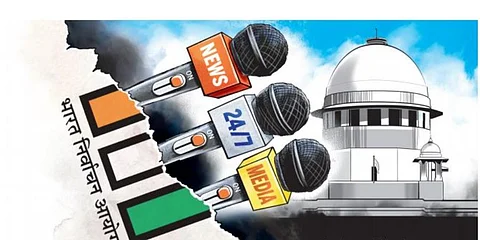

The Election Commission of India (ECI) may have legitimate reasons to be aggrieved about the harsh comments made by the judges of the Madras High Court, but its attempt to restrain oral comments of judges and prohibit the media from reporting the exchanges in court substantially weakened its case.
The Supreme Court turned down the ECI’s plea to expunge the remarks of the High Court and to restrain the media. While disposing of the Commission’s petition, Justice D Y Chandrachud declared that open access to court is “the cornerstone of constitutional freedom”. The internet has revolutionised courtroom reporting and real-time updates are part of freedom of speech and extension of the open court. It is therefore retrograde to gag reporting of court proceedings.
The judges of the High Court asked the Commission officials as to why they allowed political parties to carry on the election campaign without observing Covid protocols. Describing the Commission as an irresponsible institution, the judges said the officials should probably be hauled up for murder. The ECI felt dismayed at the “intemperate language” used by judges and rushed to the Supreme Court seeking expunction of the high court’s remarks.
The initial observations of the Bench comprising Justices D Y Chandrachud and M R Shah to the ECI’s plea is worthy of mention. They said exchanges between the Bar and the Bench instilled a sense of confidence among the public about what has transpired in the court. This dialogue between the Bar and Bench fosters the system of justice.
In conclusion, the Supreme Court said the High Courts have played a commendable role in handling the Covid-19 pandemic. However, the Madras High Court’s remarks were “harsh” and that there must be judicial restraint while making off-the cuff remarks. As regards the media, the court said there was “no substance” in the ECI prayer to restrain them from reporting judicial proceedings.
It has been argued on behalf of the ECI that the Commission does not take over governance during elections. It only issues guidelines. If there is a breach, the ECI cannot be held responsible. This argument is absolutely fallacious. A Commission that regularly transfers senior officials in states—it moved out the West Bengal DGP by an order and replaced him with another officer on March 9—now claims that it “does not take over governance”! Further, the Commission that closely monitors the working of state governments from the day the election is announced is now claiming that it is helpless if its guidelines are not followed!
One wonders whether the citizens’ right to free and fair elections is safe in the hands of bureaucrats who are manning the ECI today. The Commission’s specious arguments and its attempt to gag the media are matters of concern. A reading of the Constituent Assembly debates will show how meticulously our founding fathers drafted Article 324 to make the ECI independent and autonomous and provide every Chief Election Commissioner a vajra kavach—a strong impenetrable armour—in the form of the proviso to Article 324(5) that gives him the security of office like that of a judge of the Supreme Court, so that he or she may function fearlessly. Apart from this, a simple reading of Article 324, which gives it the power of “superintendence, direction and control of elections”, should demolish the ECI’s “I am helpless” argument.
One of the barbs that is flung at the Narendra Modi government is that it has hand-picked the election commissioners in order to influence the Commission’s decisions. This writer has no knowledge about the truth or otherwise of this charge, but having seen the working of the ECI from the days of S L Shakdher as the chief election commissioner (when Morarji Desai, Charan Singh and Indira Gandhi held the office of prime minister); R V S Peri Sastri (appointed when Rajiv Gandhi was prime minister); and T N Seshan (appointed by the Chandrashekar government at the instance of Rajiv Gandhi, one is told); it can be said that every government has hand-picked the CEC and the election commissioners. It is also reasonable to presume that in every major election, every government has had its wish list relating to polling dates, etc. One part of this interaction with the ECI is formal while the other part is informal. But ultimately, when it comes to determining the dates of polling, etc., the government can have its say, but the ECI must have its way. Those who feel this equilibrium is disturbed will ask questions, not of the government, but the Election Commission, and the poll panel is bound to answer.
In the present context, the most controversial decision taken by the ECI relates to an eight-phase poll in West Bengal, as against a single day poll on April 6 in Tamil Nadu, Kerala and Puducherry and 40 seats in Assam. In other words, the ECI held polls in 444 constituencies in all these states on a single day but wanted eight-phase polling for 294 constituencies in West Bengal. What is the justification? The Commission must answer. When the daily rise of Covid cases shot beyond one lakh in the first week of April, why did it not curtail the campaign or strictly enforce norms? It eventually took some half-hearted steps after the Madras High Court rapped it on the knuckles.
The ECI must answer these questions. It cannot short-circuit the debate. As the Supreme Court observed during the hearing: “Institutions have to be strong and vibrant for democracy to survive”. There cannot be two opinions about that.
A Surya Prakash
Former Chairman, Prasar Bharati and Scholar, Democracy Studies
(suryamedia@gmail.com)